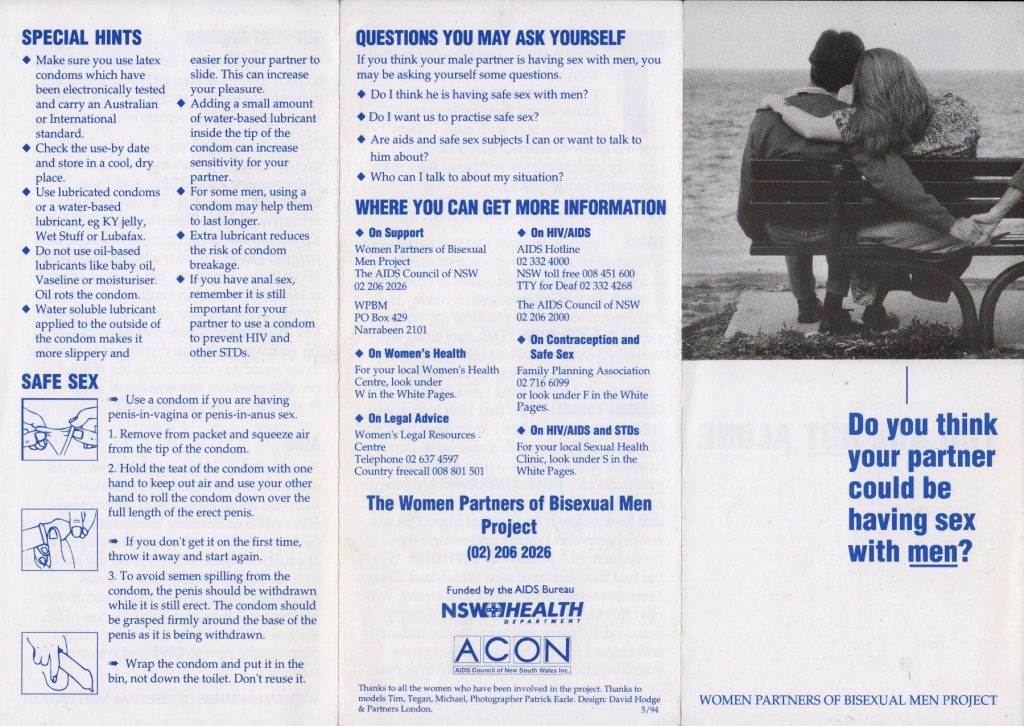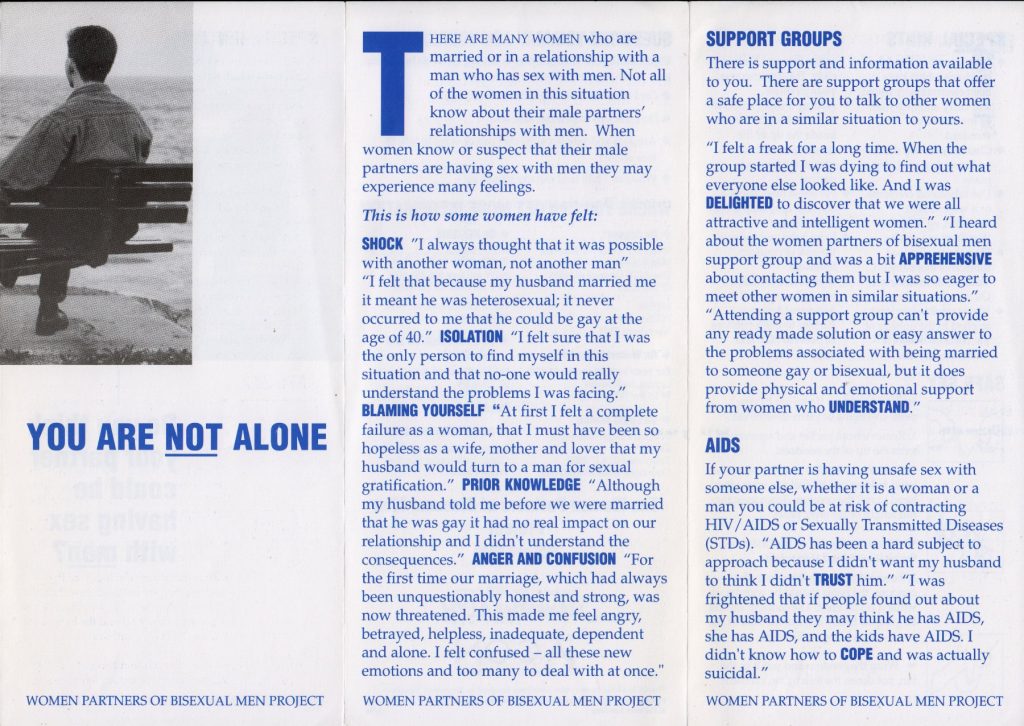The bisexual bench makes a reappearance in a leaflet that accompanied the poster from the Australian 'Women Partners of Bisexual Men Project':
Do you think your partner could be having sex with men?
YOU ARE NOT ALONE
There are many women who are married or in a relationship with a man who has sex with men. Not all of the women in this situation know about their male partners'[1]With the apostrophe here, it reads like 'the women have more than one male partner'! relationships with men. When women know or suspect that their male partners are having sex with men they may experience many feelings.
This is how some women have felt:
SHOCK "I always thought that it was possible with another woman, not another man" "I felt that because my husband married me it meant he was heterosexual; it never occurred to me that he could be gay at the age of 40." ISOLATION "I felt sure that I was the only person to find myself in this situation and that no-one would really understand the problems I was facing." BLAMING YOURSELF "At first I felt a complete failure as a woman, that I must have been so hopeless as a wife, mother and lover that my husband would turn to a man for sexual gratification." PRIOR KNOWLEDGE "Although my husband told me before we were married that he was gay it had no real impact on our relationship and I didn't understand the consequences." ANGER AND CONFUSION "For the first time our marriage, which had always been unquestionably honest and strong, was now threatened. This made me feel angry, betrayed, helpless, inadequate, dependent and alone. I felt confused – all these new emotions and too many to deal with at once."
Support groups
There is support and information available to you. There are support groups that offer a safe place for you to talk to other women who are in a similar situation to yours.
"I felt a freak for a long time. When the group started I was dying to find out what everyone else looked like. And I was DELIGHTED to discover that we were all attractive and intelligent women." "I heard about the women partners of bisexual men support group and was a bit APPREHENSIVE about contacting them but I was so eager to meet other women in similar situations." "Attending a support group can't provide any ready made solution or easy answer to the problems associated with being married to someone gay or bisexual, but it does provide physical and emotional support from women who UNDERSTAND."
AIDS
If your partner is having unsafe sex with someone else, whether it is a woman or a man you could be at risk of contracting HIV/AIDS or Sexually Transmitted Diseases (STDs). "AIDS has been a hard subject to approach because I didn't want my husband to think I didn't TRUST him." "I was frightened that if people found out my husband they may think he has AIDS, she has AIDS, and the kids have AIDS. I didn't know how to COPE and was actually suicidal."
Special hints
- Make sure you use latex condoms which have been electronically tested and carry an Australian or International standard.
- Check the use-by date and store in a cool, dry place.
- Use lubricated condoms or a water-based lubricant, eg KY Jelly, Wet Stuff or Lubafax.
- Do not use oil-based lubricants like baby oil, Vaseline or moisturiser. Oil rots the condom.
- Water soluble lubricant applied to the outside of the condom makes it more slippery and easier for your partner to slide. This can increase your pleasure.
- Adding a small amount of water-based lubricant inside the tip of the condom can increase sensitivity for your partner.
- For some men, using a condom may help them to last longer.
- Extra lubricant reduces the risk of condom breakage.
- If you have anal sex, remember it is still important for your partner to use a condom to prevent HIV and other STDs.
Safe sex
⇢ Use a condom if you are having penis-in-vagina or penis-in-anus sex.
1. Remove from packet and squeeze air from the tip of the condom.
2. Hold the teat of the condom with one hand to keep out air and use your other hand to roll the condom down over the full length of the erect penis.
⇢ If you don't get it on the first time, throw it away and start again.
3. To avoid semen spilling from the condom, the penis should be withdrawn while it is still erect. The condom should be grasped firmly around the base of the penis as it is being withdrawn.
⇢ Wrap the condom and put it in the bin, not down the toilet. Don't reuse it.
Questions you may ask yourself
If you think your male partner is having sex with men, you may be asking yourself some questions.
- Do I think he is having safe sex with men?
- Do I want us to practise safe sex?
- Are aids (sic) and safe sex subjects I can or want to talk to him about?
- Who can I talk to about my situation?
Where you can get more information
⋄ On support
Women Partners of Bisexual Men Project
The AIDS Council of NSW
[phone number]
WPBM
[address]
⋄ On Women's Health
For your local Women's Health Centre, look under W in the White Pages.[2]i.e. the main telephone directory
⋄ On Legal Advice
Women's Legal Resources Centre
[phone numbers, include a free call number]
⋄ On HIV/AIDS
AIDS Hotline
[phone numbers, including free call and text for the deaf]
The AIDS Council of NSW
[their general phone number?]
⋄ On Contraception and Safe Sex
Family Planning Association
[phone number]
or look under P in the White Pages.
⋄ On HIV/AIDS and STDs
For your local Sexual Health Clinic, look under S in the White Pages.
The Women Partners of Bisexual Men Project
[phone number]
Funded by the AIDS Bureau
NSW Health Department
ACON
AIDS Council of New South Wales Inc
As you might expect from the name of the creators and publishers of the leaflet, this is again absolutely aimed at female partners of men, rather than the men themselves.
Fascinatingly, if you ignore the use of the project's title on five of the six pages, there are three uses of "gay" within it and only one "bisexual".. and that's in the phrase "gay or bisexual".
Obviously they're talking about behaviourally bisexual men, rather than bisexual-identified men, but it's striking that there are literally no positives given for having a bisexual partner. The only "DELIGHT" is in discovering what other women in "a similar situation" were like.
Even talking to him about it is mentioned only as "Are Aids and safe sex subjects I can or want to talk to him about?" and that's after the women thinking if he's having safe sex with other men and if she wants to use condoms. For the latter it's "practise safe sex" rather than "continue to practise safe sex" or even "restart practising safe sex" too. "Who can I talk to about my situation?" Him?
Interestingly, the idea that he might be (also?) being having sex with another woman is explicitly mentioned, but it's very heavily implied that this is him being unfaithful rather than doing it with the reader's knowledge and consent.
In the UK, when research was done at around the same time, just over a third of female partners knew more or less everything about their partner's current bisexual behaviour: that he was attracted to other men, that he'd had sex with other men, and that he had done so in the past two years.[3]If that last bit wasn't the case, they didn't qualify for the survey! Almost the same number knew he was being sexual with other women too.[4]The researchers here were very struck by the way that the average number of six partners per year for the bisexually behaving men – three men, three women – was the same as the six men … Continue reading There's no hint that might be true here.
Finally, having had someone wonder very recently what I meant when I wrote 'PIV sex', it's also noticeable that this leaflet from 1994 talks about "penis-in-vagina or penis-in-anus sex" rather than, say, "sex" in its condom use section. It's also noticeable that it doesn't suggest anywhere that you might want to use them for 'penis-in-mouth' sex, despite talking about "safe sex" rather than "safer sex". A sign that Australian HIV organisations had realised by this point that fellatio is, at worst, very very low risk for HIV or the way they choose to say "safe" rather than "safer" in general?
Notes
| ↑1 | With the apostrophe here, it reads like 'the women have more than one male partner'! |
|---|---|
| ↑2 | i.e. the main telephone directory |
| ↑3 | If that last bit wasn't the case, they didn't qualify for the survey! |
| ↑4 | The researchers here were very struck by the way that the average number of six partners per year for the bisexually behaving men – three men, three women – was the same as the six men average for their gay men's surveys. |

